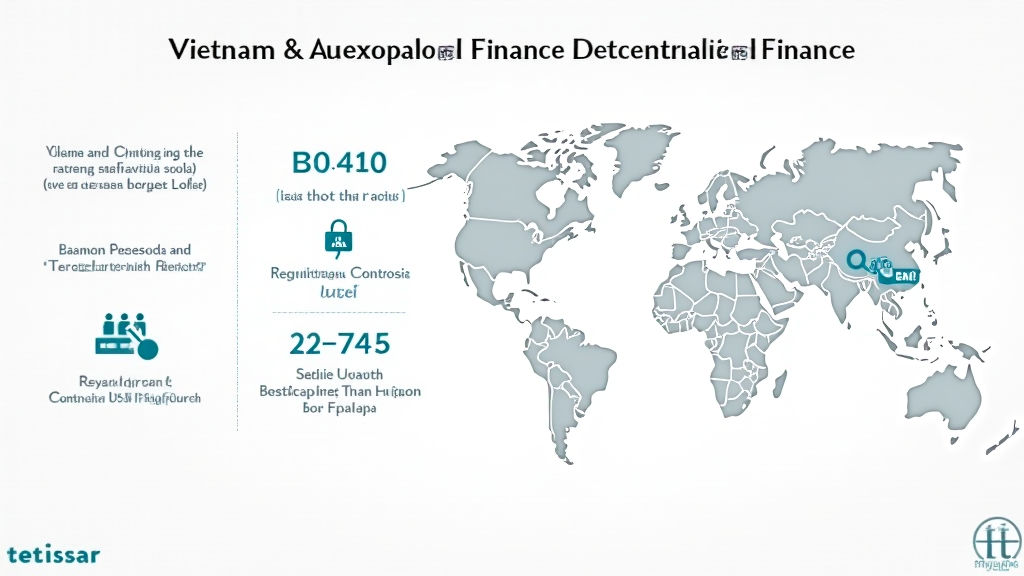Introduction: The Rise of Decentralised Finance in Vietnam
As of 2024, the world has witnessed significant changes in the financial landscape, especially with the rise of decentralised finance (DeFi). Notably, Vietnam has emerged as a strong player in this sector, with a staggering 140% user growth rate in the DeFi space over the past year. In this article, we will delve into the trends of decentralised finance in Vietnam, exploring the dynamics that are critically shaping this burgeoning market and how it correlates to global decentralised finance trends.
Understanding Decentralised Finance (DeFi)
Decentralised finance (DeFi) comprises financial services provided on blockchain networks, offering an alternative to traditional financial institutions. Imagine the closeness of accessing financial services without the limitation of a central authority – similar to how we communicate freely on the internet. DeFi takes this principle and applies it to lending, borrowing, trading, and other financial services. Here’s what you need to know:
- Accessibility: DeFi platforms are open to anyone with an internet connection.
- Transparency: All transactions are recorded on public blockchains, offering high levels of trust.
- Interoperability: DeFi services are often compatible across different platforms.
Current Trends in Decentralised Finance in Vietnam
Vietnam is increasingly adapting to various global DeFi trends while fostering its local initiatives. Some of the notable trends include:

Rise of Local Platforms
- Vietnamese Startups: Numerous startups are venturing into the DeFi arena, creating platforms tailored to local needs, such as Hibit, which aims to simplify transactions for Vietnamese users.
- User-Friendly Interfaces: To enhance user experience, local platforms are concentrating on developing intuitive interfaces.
Legal and Regulatory Developments
The Vietnamese government is actively considering regulations regarding cryptocurrencies and DeFi. Their goal is to ensure a secure environment while not stifling innovation. This is crucial, as the lack of regulatory clarity can deter investment and adoption.
Integration with Traditional Finance
Many Vietnamese financial institutions are exploring partnerships with DeFi projects, thereby melding the efficiency of decentralised systems with the reliability of traditional banking.
Key Challenges Faced by DeFi in Vietnam
While the DeFi space is thrilling, it also comes with its unique set of challenges:
- Security Risks: With $4.1 billion lost in DeFi hacks in 2024, vulnerabilities are a paramount concern.
- Lack of Financial Literacy: The complexities of DeFi platforms often confuse new users.
- Regulatory Uncertainty: With evolving laws, local projects face challenges in compliance.
Future of Decentralised Finance in Vietnam
Looking ahead to 2025, the DeFi landscape in Vietnam is poised for further growth, driven by:
Increased Adoption Rates
As educational initiatives ramp up, user adoption is expected to rise, particularly among tech-savvy youth.
Innovation in Financial Services
New financial products tailored to Vietnamese consumers will likely emerge, enhancing financial inclusivity.
Community Engagement and Development
Local communities and developers are joining forces to create sustainable DeFi ecosystems through hackathons and educational workshops.
Conclusion: Embracing Decentralised Finance in Vietnam
As Vietnam positions itself at the forefront of the decentralised finance trends in Southeast Asia, it attracts both local and global investors. The growing user base and the active participation of financial institutions indicate a strong future for the crypto ecosystem. By continuing to forge ahead with regulations that foster innovation while protecting participants, Vietnam could solidify its place as a leader in the DeFi arena.
For those interested in exploring more about impacting platforms in the DeFi space, including those emerging in Vietnam, check out HIBT Vietnam for insights and developments on decentralised financial services.





